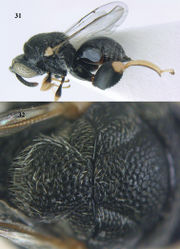Brachymeria carinata
| Notice: | This page is derived from the original publication listed below, whose author(s) should always be credited. Further contributors may edit and improve the content of this page and, consequently, need to be credited as well (see page history). Any assessment of factual correctness requires a careful review of the original article as well as of subsequent contributions.
If you are uncertain whether your planned contribution is correct or not, we suggest that you use the associated discussion page instead of editing the page directly. This page should be cited as follows (rationale):
Citation formats to copy and paste
BibTeX: @article{Narendran2016ZooKeys, RIS/ Endnote: TY - JOUR Wikipedia/ Citizendium: <ref name="Narendran2016ZooKeys">{{Citation See also the citation download page at the journal. |
Ordo: Hymenoptera
Familia: Chalcididae
Genus: Brachymeria
Name
Brachymeria carinata Joseph, Narendran & Joy, 1970 – Wikispecies link – Pensoft Profile
- Brachymeria carinata Joseph, Narendran & Joy, 1970: 22 (♀, India (Calicut) (BMNH)).
- Brachymeria shansiensis vietnamensis Joseph, Narendran & Joy, 1972: 348 ((♂ “♀”) Vietnam (BPBM) (synonymised by Narendran 1989[1], with Brachymeria carinata Joseph, Narendran & Joy).
- [[Brachymeria
(Neobrachymeria) ghani|Brachymeria (Neobrachymeria) ghani]] Joseph, Narendran, & Joy, 1973: 196. (♀, India (Madurai) (USNM) (synonymised by Narendran 1989[1], with Brachymeria carinata Joseph, Narendran & Joy).
Material
1 ♀ (RMNH), “Vietnam: Ninh Thuân, Núi Chúa N. P., dry south part; Mal. traps, 100–180 m, 22–29.v.2007, C. v. Achterberg & R. de Vries, RMNH’07”; 1 ♀ (BPBM), “Vietnam, 8.xi.1960, C.M. Yoshimoto”; 2 ♀, “Vietnam, 12–28.xii.1963, Gayden”.
Diagnosis
This species comes near Brachymeria margaroniae Joseph, Narendran & Joy in general appearance, but differs from that species in having: 1) hind tibia with base yellow (in Brachymeria margaroniae hind tibia with base reddish black); 2) area below scrobe with median raised smooth portion absent (in Brachymeria margaroniae area below scrobe with a raised median smooth portion) and 3) MV about 3 × PMV (in Brachymeria margaroniae MV twice PMV).
Description
(based on specimen from Núi Chúa N.P.), ♀, length of body 4.3 mm.
Colour. Black with following parts as follows: eyes dull grayish yellow with pale reflecting yellow spots; ocelli pale reflecting yellow; tegula pale yellow; all coxae and trochanters concolorous with mesosoma; femora black with apices yellow; all tibiae and tarsi yellow with a black line along ventral margin of hind tibia; wings hyaline with veins brown. Pubescence silvery white.
Head. Width of head in anterior view 1.2 × its height; width in dorsal view slightly broader than mesosoma (excluding tegulae) (26:25), 2.4 × its length. POL 4 × OOL; AOL 2.3 × OOL; interocular distance 2.2 × POL; pre-orbital carina present but not reaching malar ridge; post-orbital carina absent; scrobe reaching anterior ocellus; area below scrobe without a raised smooth area, parascrobal space and face longitudinally striate reticulate and densely pubescent; area above parascrobal space and vertex with close umbilicate setigerous pits, interstices rugose and carinate; height of malar space 0.2 × height of eye in profile; eye height 2.4 × its length in profile; anterior genal angle slightly acute, 80° to the vertical axis of malar space; posterior genal angle obtuse to the subvertical geno-temporal margin; gena densely pubescent. Antennal radicula 0.2 × length of scape; scape not reaching anterior ocellus. Relative L:W of antennal segments:scape = 14:3; pedicel = 3:4; anellus = 1:3; F1 = 3:5; F2 = 4:5; F3 = 4:5; F4 = 3:6; F5 = 3:6; F6 = 3:6; F7 = 3:6; clava = 6:6.
Mesosoma. Pronotum, mesoscutum and scutellum with close posterior margin of pronotum, slightly concave; lateral panel of pronotum micro-reticulate, without cross striae or carinae and with transverse fovea at lower margin; pronotum with a cross carina adjacent to posterior margin; carina of anterior side limited to sides only; middle lobe of mesoscutum a little shorter than its width (15:17); scutellum a little wider than long (14:12), apex entire; propodeum 50° to the plain of scutellum (not vertical or subvertical); postspiracular tooth indistinct.
Wings. Fore wing 2.6 × longer than wide; relative length of veins SMV 13; parastigma = 5; MV = 17; PMV = 6; STV = 3.
Legs. Hind coxa smooth and shiny on dorsal half, densely pubescent and punctate on ventral side, inner ventro-mesal tooth absent; hind femur 1.8 × as long as wide, outer ventral margin with a row of 12 differently sized teeth; inner basal tooth absent; mesosternal shelf present.
Metasoma. Metasoma slightly longer than mesosoma in dorsal view (30:26); T1 reaching middle, densely micro-sculptured; T2 to T5 densely micro-sculptured and pitted, with pubescence on sides; T6 with 7–8 cross rows of shallow pits, pits and interstices rugose. Ovipositor sheath projecting posteriorly and visible in dorsal view.
Male. Unknown.
Hosts
Hyperparasitic in Psychidae (Lepidoptera).
Distribution
Vietnam, India, China, Malaysia (North Borneo).
Taxon Treatment
- Narendran, T; van Achterberg, C; 2016: Revision of the family Chalcididae (Hymenoptera, Chalcidoidea) from Vietnam, with the description of 13 new species ZooKeys, (576): 1-202. doi
Images
|
Other References
- ↑ 1.0 1.1 Narendran T (1989) Oriental Chalcididae (Hymenoptera: Chalcidoidea). Zoological Monograph. Department of Zoology, University of Calicut, Kerala, 1–441.
